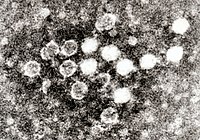
Photo from wikipedia
Introduction Human Parvovirus B19 (B19V) infection may cause red cell aplasia in patients infected with human immunodeficiency virus (HIV). The introduction of highly active antiretroviral therapy (HAART) has improved the… Click to show full abstract
Introduction Human Parvovirus B19 (B19V) infection may cause red cell aplasia in patients infected with human immunodeficiency virus (HIV). The introduction of highly active antiretroviral therapy (HAART) has improved the immune function of these patients, modifying the course of B19V infection. To better understand the importance of B19V infection in the HAART era, a follow-up study of a cohort of HIV-infected individuals was conducted during an eight-year period (2001–2008) at the Infectious Diseases Department of Antonio Pedro University Hospital (HUAP) at the Fluminense Federal University (Niterói, RJ, Brazil). Methods Blood samples were collected from 313 HIV-infected individuals who attended the general medical outpatient clinic for routine care. IgG and IgM antibodies against B19V were detected in serum samples using a commercial enzyme immunoassay (Biotrin). B19V viraemia was evaluated by the detection of B19V-DNA by polymerase chain reaction (PCR). To genotype B19V strains PCR products were subjected to direct sequencing and phylogenetic analysis. Results The seropositivity to B19V IgG antibodies was 72% (225/313). Approximately 30% (28/88) of anti-B19V IgG negative patients seroconverted. Most seroconversions occurred during incidence peaks of a B19V infection in Niterói (2005–2006). No clinical manifestations of B19V infection were detected during the seroconversion period. B19V-DNA was detected in 5/88 patients, four of whom also exhibited seroconversion. Four of the patients were infected with subgenotype 1a strains and the remaining patient was infected with a subgenotype 3b. Anaemia was detected in 8/88 patients, but all patients recovered without requiring immunoglobulin and/or blood transfusions. Conclusion: In the HAART era, the presence of chronic anaemia in HIV-infected patients should alert the physician to the possibility of B19V infection especially during epidemics. There were no apparent relationships between the infecting genotype and the clinical course and this is the first report of genotype 3b in Rio de Janeiro.
Journal Title: Sexually Transmitted Infections
Year Published: 2017
Link to full text (if available)
Share on Social Media: Sign Up to like & get
recommendations!